What We're Reading Now
Wish You Were Here
8 November 2022
Geof has been exploring the rich databases of the Library of Virginia. Inspired by postcards he collects, he’s been researching the stories of old motels, restaurants, and tourist attractions and browsing old newspapers to learn about the past histories of these artifacts, as well as searching Google Earth and maps to see what now stands in their place.
Postcards were the social media of our parents and grandparents. A three-and-a-half inch by five-and-a-half inch cardstock with a picturesque image on one side and blank space for three or four sentences on the other. Posted with a stamp.
I have a modest collection of postcards from the 1940s and 1950s, mostly of places in Virginia. Motels are my favorite, specifically those before interstate highways. Sending a postcard took effort. Picking out the right card. Writing a short note and addressing it. Buying the stamp and mailing it. It was more intimate compared to today’s mass social media blasts.
For example, there’s the Shenandoah Motel of Front Royal with a technicolor picture of stone cottages framed by Highway 12 and a picturesque blue sky on the front. The back advertises “34 Attractive, Well Furnished Units, Tiled Shower Baths, Airfoam Mattresses, Heat & Radios. 2 Miles from Skyline Drive. Mr. & Mrs. Kay Brown, Owners and Operators.”
In black cursive is a quick message: “Dear Alice and all, here we are tonight from which point we expect to go over Skyline Drive tomorrow. Stopped a short time at Gettysburg this AM. It is pretty cool here, all well so far. Love dad.” A circle postmark dated Dec 2, 10 – AM 1953 cancels the two-cent stamp. A brief update, mailed directly to friends and family.
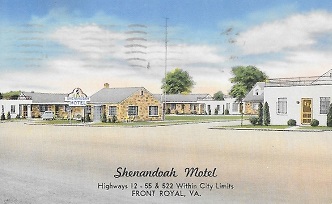
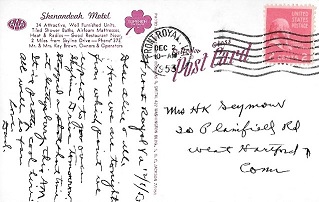
For me, postcards are also a portal to the past. The entry point to a rabbit hole that I relish diving into headfirst.
In Richmond at the corner of Grace and Jefferson streets there sits an empty three-story Spanish inspired building. I’ve passed the building countless times, paying little attention to the vacant storefront and empty windows. That is, until I won an e-Bay auction for the Sevilla Hotel Apartments postcard. The 1930s postcard features a proud building with brightly colored green awnings and storefronts stocked with colorful items.
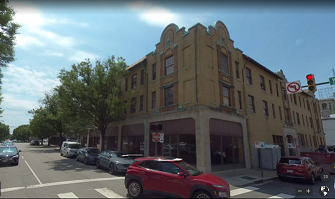
image copyright Google Earth
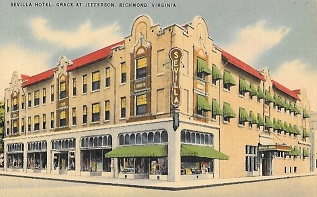
The Richmond News Company Postcard
Armed with the Library of Virginia databases, I researched the Sevilla postcard for hours. The front page of the May 28, 1925, Richmond Times Dispatch reported the purchase of the property for the purposes of “erect(ing) a furnished apartment.” Eight months later the Times Dispatch featured a front-page image of the almost completed Sevilla, billed as “one of the most modern structures in the city.”
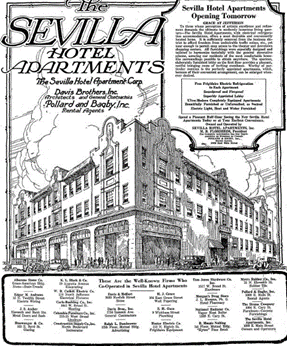
Richmond Times Dispatch, Sunday, May 23rd, 1926
The Sevilla opened the 23rd of May 1926. A full-page advertisement described modern living arrangements for “those whose perception of artistic excellence and refinement demands the ultimate in modernly luxurious living quarters. Apartments with electrical refrigeration accommodations, offers a most desirable and conveniently located home.”
The Sevilla enjoyed a decade of success. “Over a thousand persons visited the Sevilla Hotel Apartments…inspecting the newest thing in homelike apartment-hotel accommodations in the city,” according to a May 25, 1926, article about the Sevilla. Classifieds advertised first floor shops like tailors, cleaners, drug stores, and soda fountains as well as the occasional vacancy for the next seven years.
The nature and news about the Sevilla started to change in the mid-30s during the height of the depression. A 1933 classified for the Savilla advertised “Substantial Rent Reductions” and a shift from long term leases to “day, week, and monthly” terms. A Trustee’s Auction Sale appeared in an October 1935 edition of the Times Dispatch. The Sevilla survived.
Over time the articles become less and less frequent. Those that did appear gave a sense of the shifting economics of the Sevilla and its surrounding area. A 1951 newspaper article describes the robbery of the Sevilla night clerk by a recently released inmate from the state penitentiary located nearby. “The night clerk, Samuel C. Jackson, told police the man entered shortly after midnight, pulled an automatic and said: ‘Is George here? I just got out of the State Pen. This is a stick-up,’” the article states. The late 1960s classifieds advertised a “weekly rate of $2.50 per person per day” for the apartments.
Fifty years after opening, The Sevilla was converted to a shelter for transients in the mid-1970s. A hotel fire in September of 1975 destroyed one unoccupied apartment and a 1979 article described “14 beds in the Sevilla Hotel and an average of 20 single men applying for beds each night.”
The research into the Sevilla offered a nostalgic, fifty-year journey during which I could trace the story of a building, the ambition of its owners and investors, as well as the lifestyle of its inhabitants. All in a few hours from my laptop.
Inspired by postcards, like the Sevilla, I can trace the history of people and places from a different time. I can rediscover my familiar surroundings from a different perspective. You don’t need a postcard to spark your curiosity. Look around you at the buildings, roads, and lots you pass every day. Then research them. I encourage you to visit your state library (here’s the link to Library of Virginia) and explore.







Comments
Our Comment Policy:
Our blog posts are only half of the conversation. What our readers have to say is equally important to us, and we're grateful for all the comments that continue the dialog.
To ensure that the discussion here is as useful as possible to all of our readers, please be respectful of our contributors and refrain from harassing, threatening and/or vulgar language. We reserve the right to screen and remove any comments from the site. If you have a question about a comment or want to discuss our policy, please contact us. We'll talk it over.
There are no comments for this entry yet.